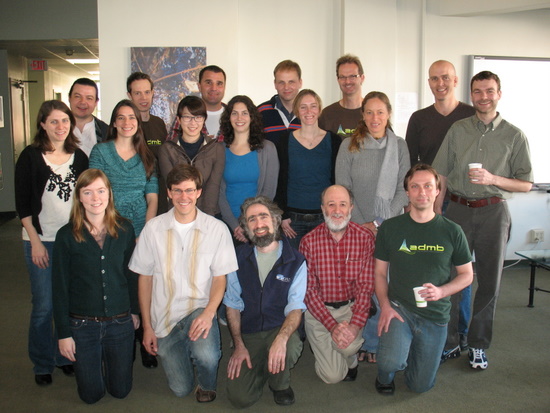NCEAS Working Groups
Evaluating and improving open source software for nonlinear statistical modeling in ecology
Project Description
Ecologists try to understand how nature works. Mathematical models, which use equations to describe how and why populations change in time and space, are one of the most powerful tools used for this purpose. Ecologists use mathematical models in many ways: one common approach is scenario planning, or “what if” games. For example, what is the best guess of the outcome if fishing were banned in an area in order to allow populations to recover? Would the populations actually recover? How long would it take? Would the community ultimately be able to harvest more fish? How confident can we be in our answers? In order to answer these questions accurately, mathematical models must accurately represent key aspects of the ecosystem in question.
Because ecosystems are complex, we often need complex models to answer even apparently simple questions. In order to obtain better predictions for the future, ecologists constantly strive to improve ecosystem models; one of the hardest parts is fitting these models to data that have been collected by ecologists, other scientists, industry (such as fishers), or the general public. Statisticians and ecologists have developed a huge variety of methods and computer programs to do this job, but they differ in their effectiveness–some are better than others, depending on the task–and the most powerful tools are complicated to learn. It is therefore important to determine which methods and computer programs work best for given applications and to demonstrate how these methods and computer programs can be used most effectively.
We evaluate three commonly-used open-source software packages: OpenBUGS, AD Model Builder, and R. To test the strengths and weaknesses of each package, we will bring together experts in all three software packages and apply these three packages to a common set of mathematical models for ecological systems. Working with the informatics staff of the National Center for Ecological Analysis and Synthesis, we will produce a web-based guide describing the utility of each package for particular applications that includes annotated model code, the data sets used in the applications, and peer-reviewed articles. We will also identify how the different packages could be improved. As mathematical models are becoming increasingly more complex and ecologists are faced with a myriad of software options, the results of this project will help ecologists and analysts across a broad spectrum of specialties.

Principal Investigator(s)
Mark N. Maunder, Benjamin Bolker, Beth Gardner
Project Dates
Start: November 1, 2010
End: July 31, 2011
completed
Participants
- Benjamin Bolker
- McMaster University
- Mollie Brooks
- University of Florida
- Liza S. Comita
- University of California, Santa Barbara
- Elizabeth E. Crone
- Harvard University
- Sarah Cubaynes
- Centre d'Ecologie Fonctionnelle et Evolutive-Centre national de la recherche scientifique CEFE-CNRS
- Trevor D. Davies
- Dalhousie University
- Perry de Valpine
- University of California, Berkeley
- Jessica Ford
- Commonwealth Scientific and Industrial Research Organisation (CSIRO)
- Beth Gardner
- North Carolina State University
- Olivier Gimenez
- Centre d'Écologie Fonctionnelle et Évolutive
- Marc Kéry
- Swiss Ornithological Institute
- Eunjung Kim
- University of Hawaii, Mānoa
- Cleridy Lennert-Cody
- InterAmerican Tropical Tuna Commission
- Arni Magnusson
- Marine Research Institute
- Steve J.D. Martell
- University of British Columbia
- Mark N. Maunder
- InterAmerican Tropical Tuna Commission
- Mihoko Minami
- Keio University
- John C. Nash
- University of Ottawa
- Anders Nielsen
- Technical University of Denmark
- James Regetz
- University of California, Santa Barbara
- Jeffrey A. Royle
- Hans J. Skaug
- University of Bergen
- Casper Willestofte Berg
- Technical University of Denmark
- Elise Zipkin
- US Geological Survey (USGS)
Products
-
Journal Article / 2013
Strategies for fitting nonlinear ecological models in R, AD Model Builder, and BUGS
-
Journal Article / 2011
Unifying optimization algorithms to aid software system users: Optimx for R
